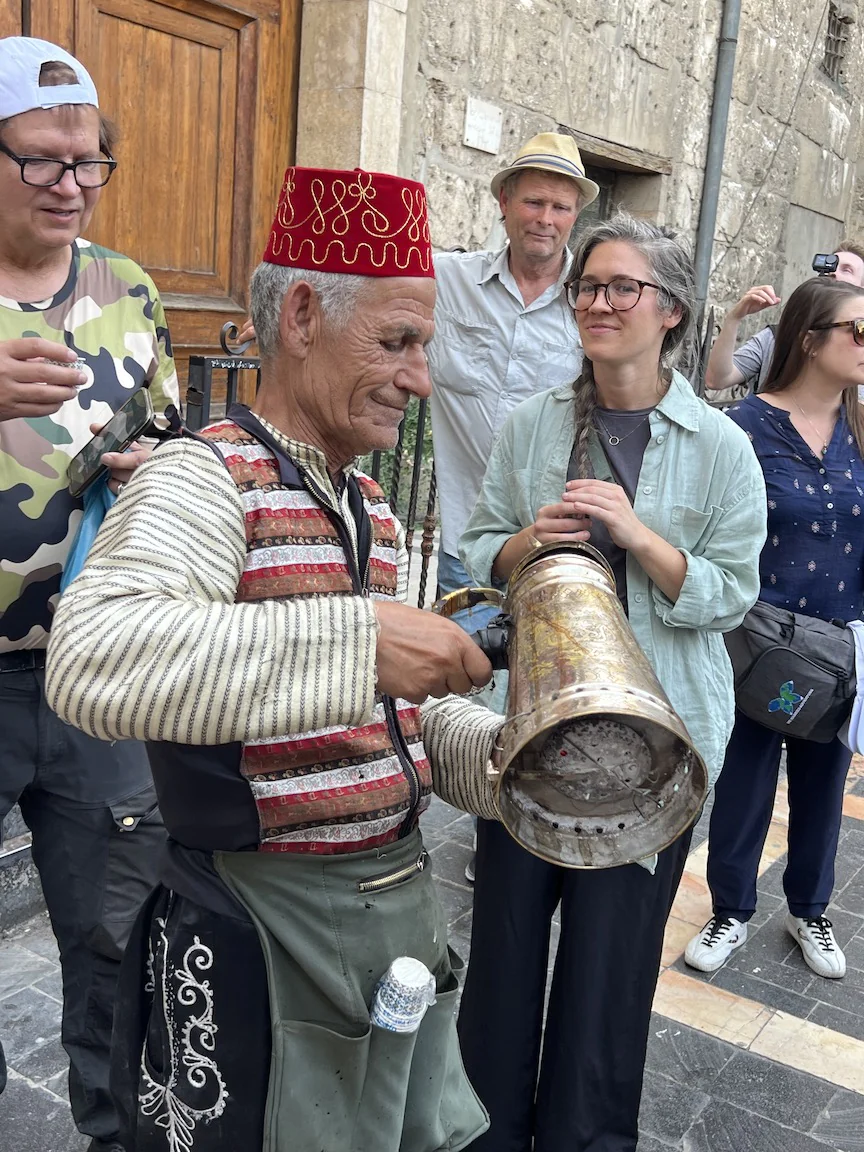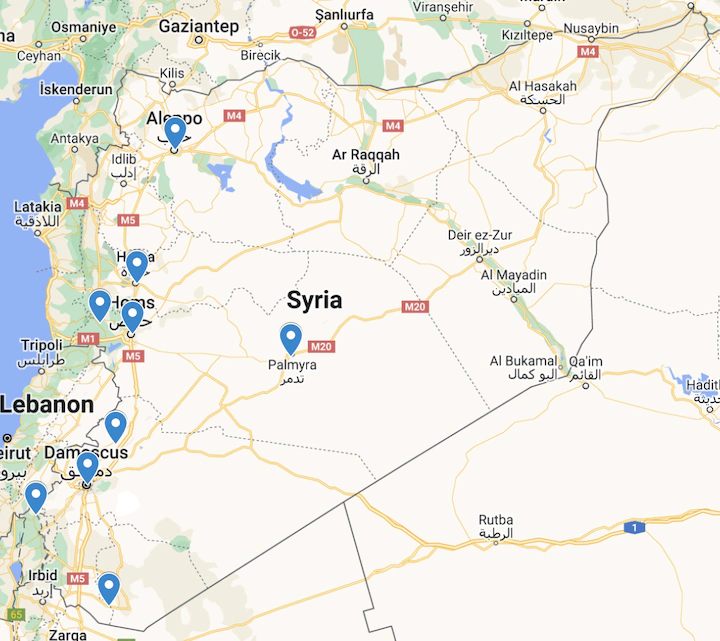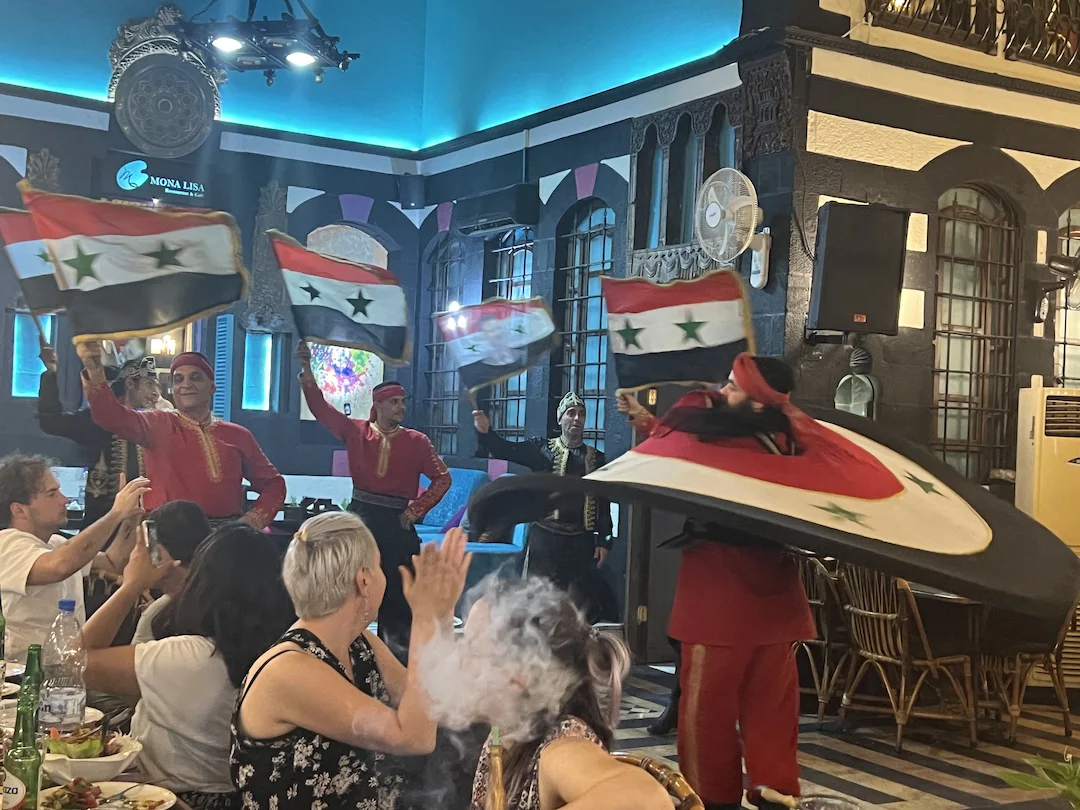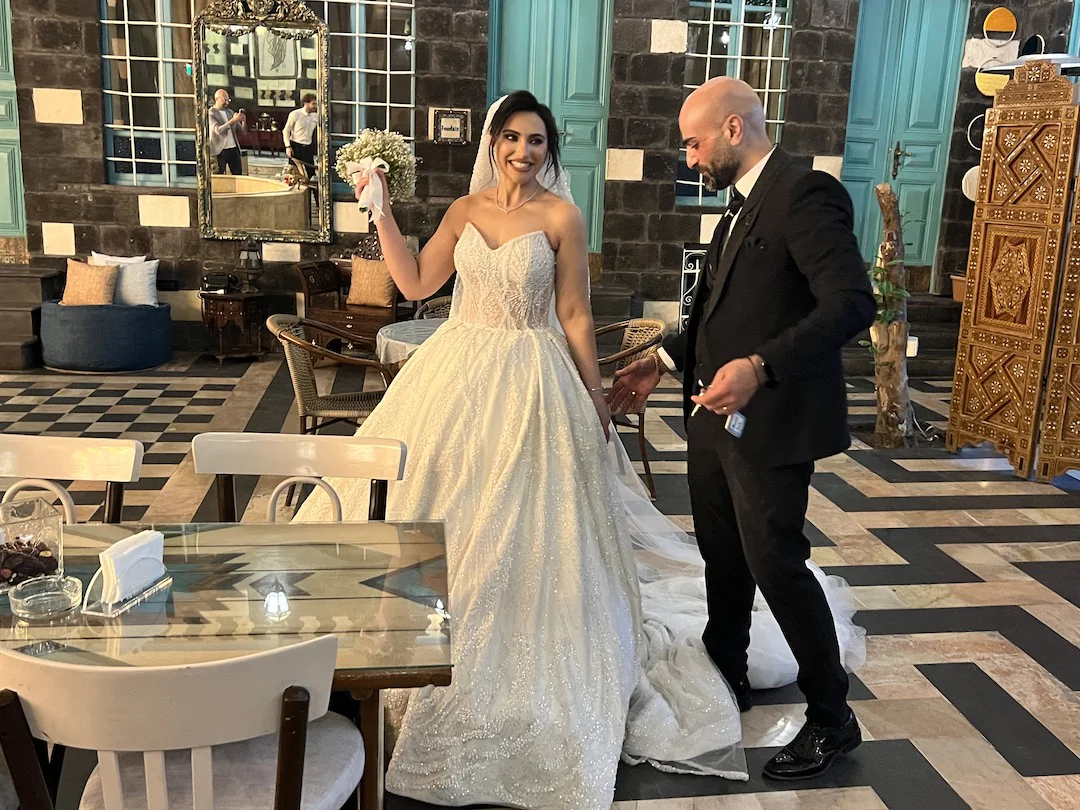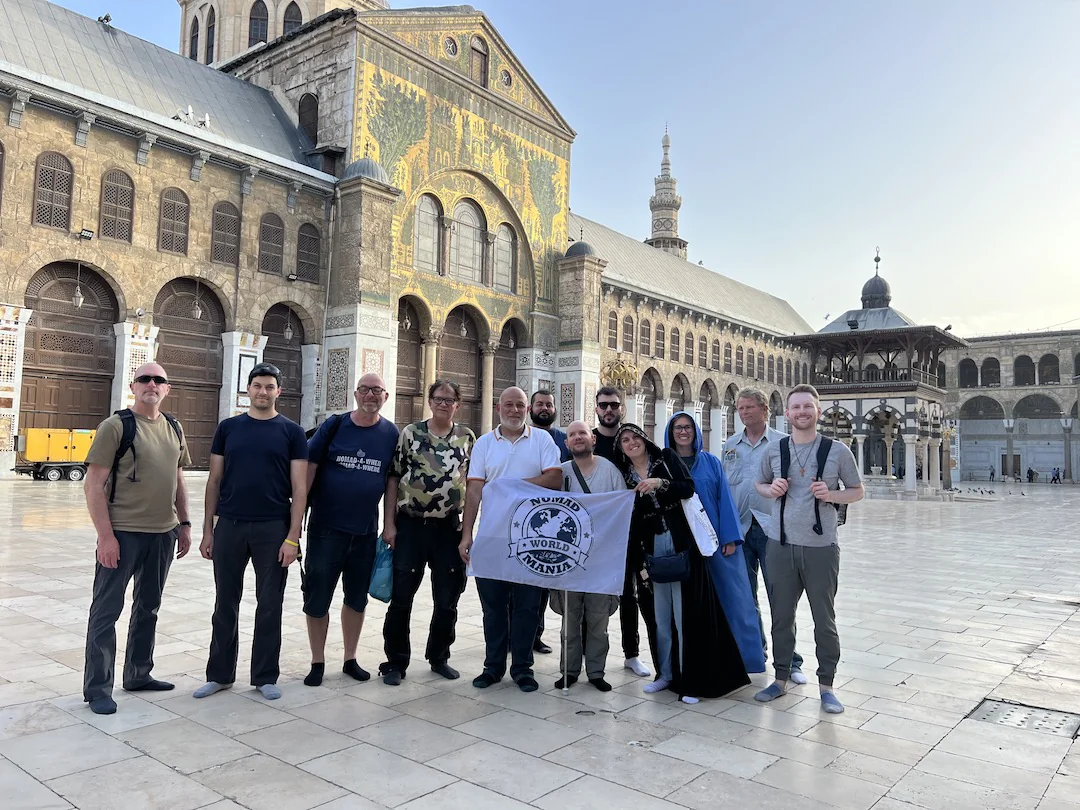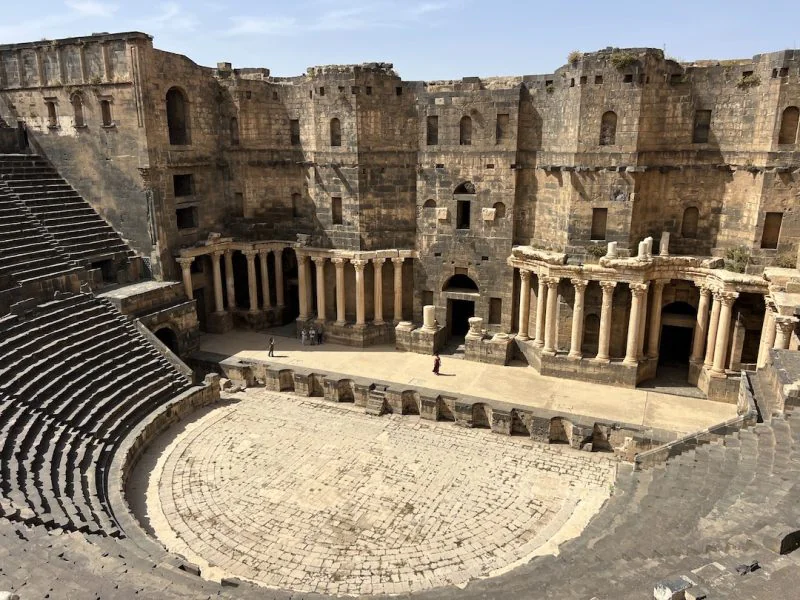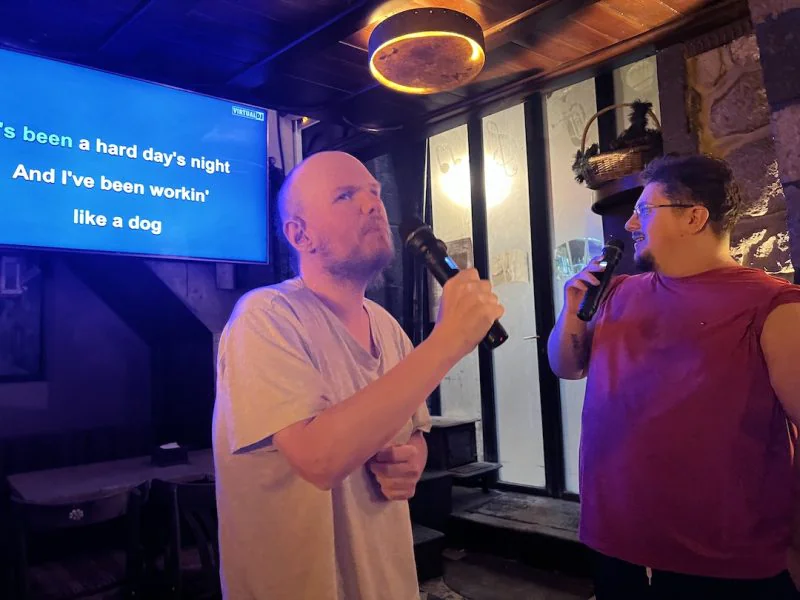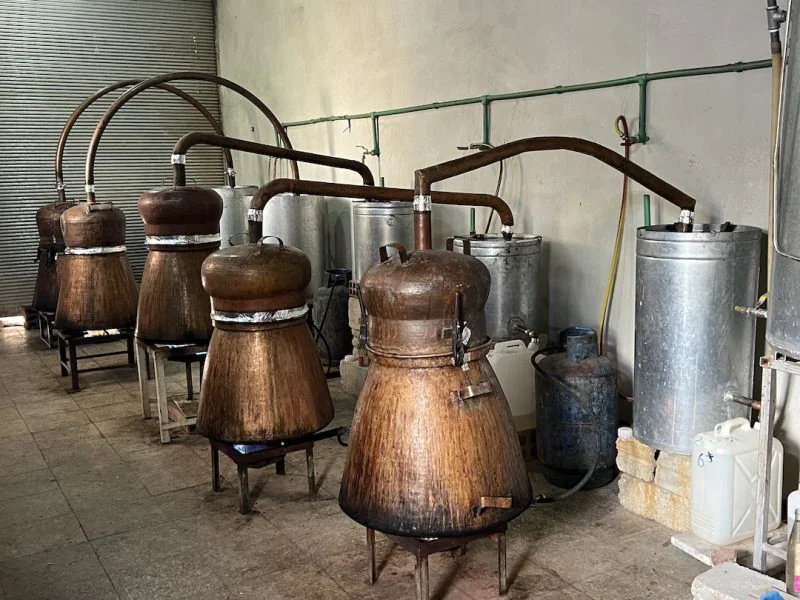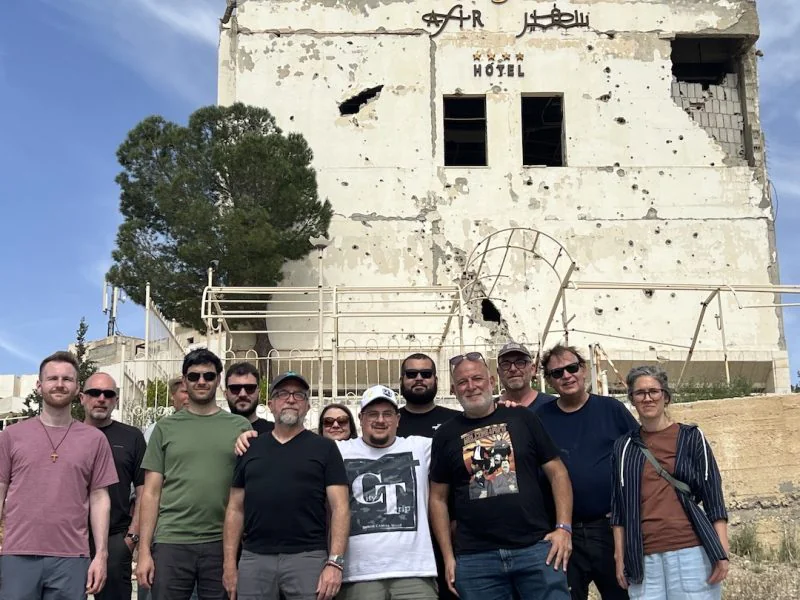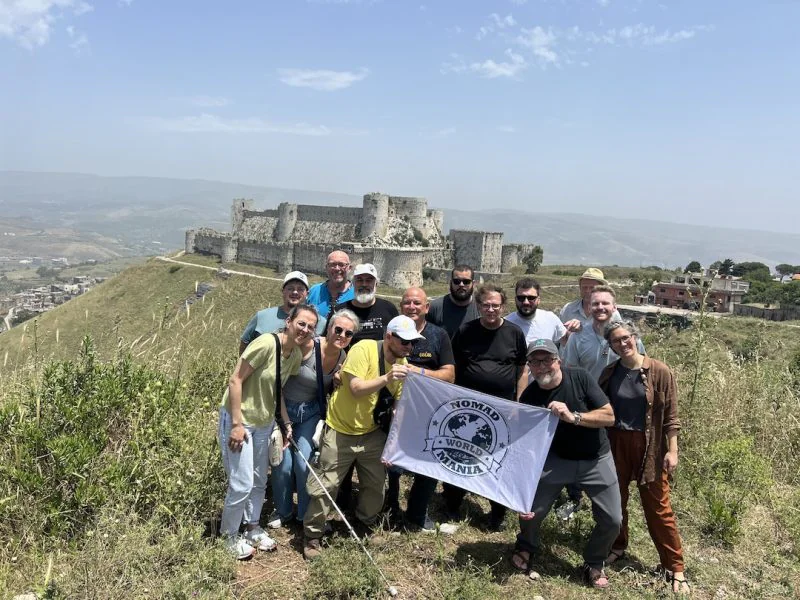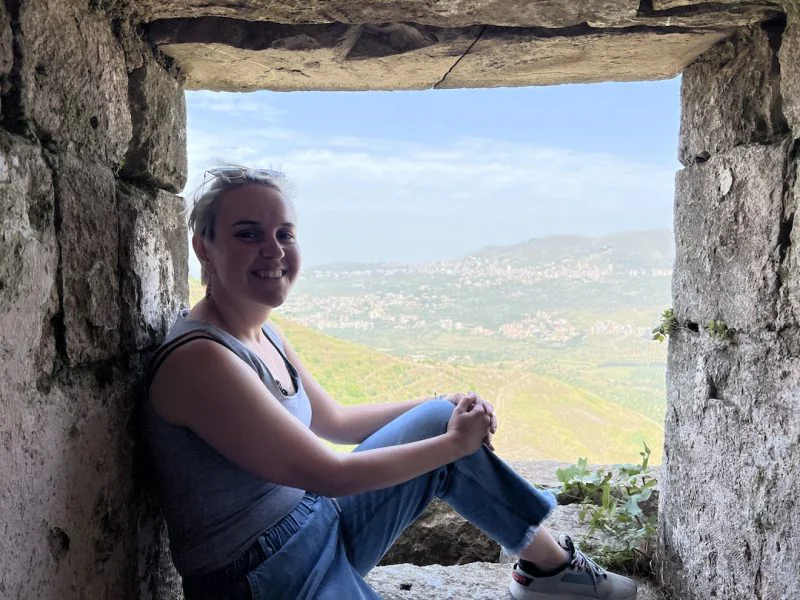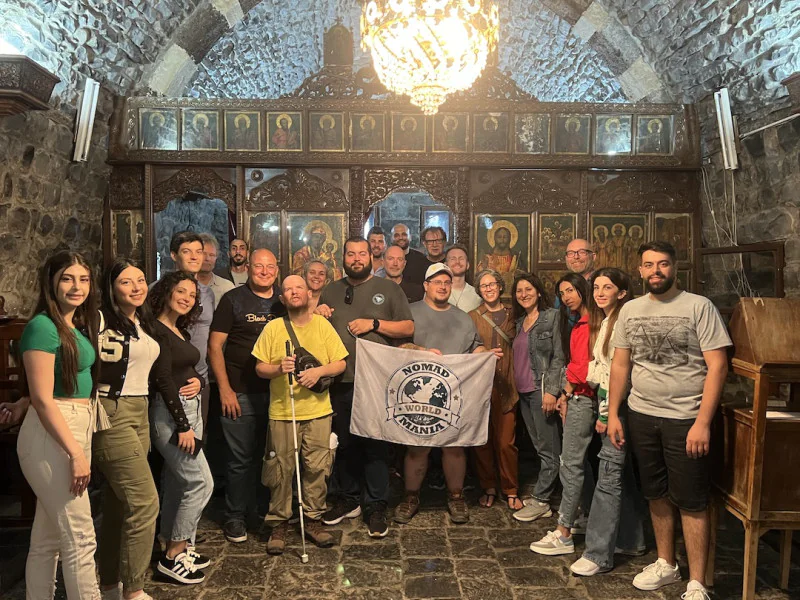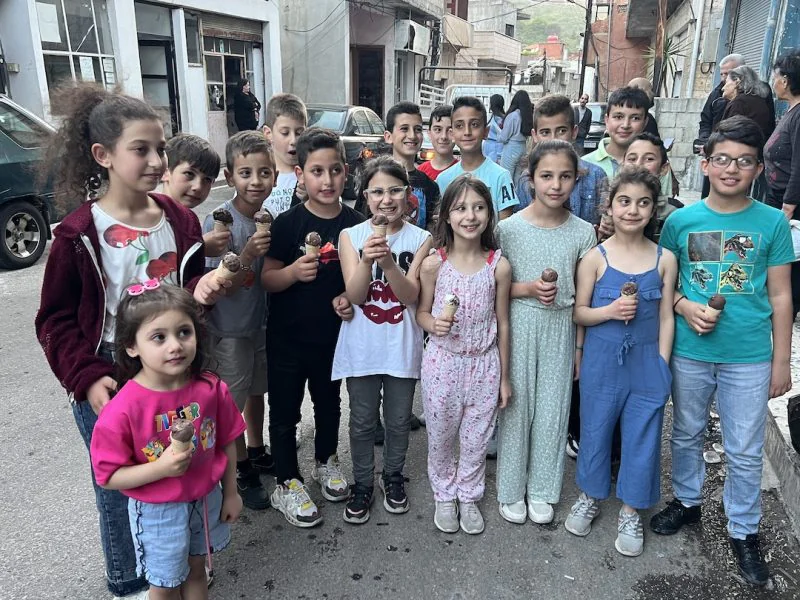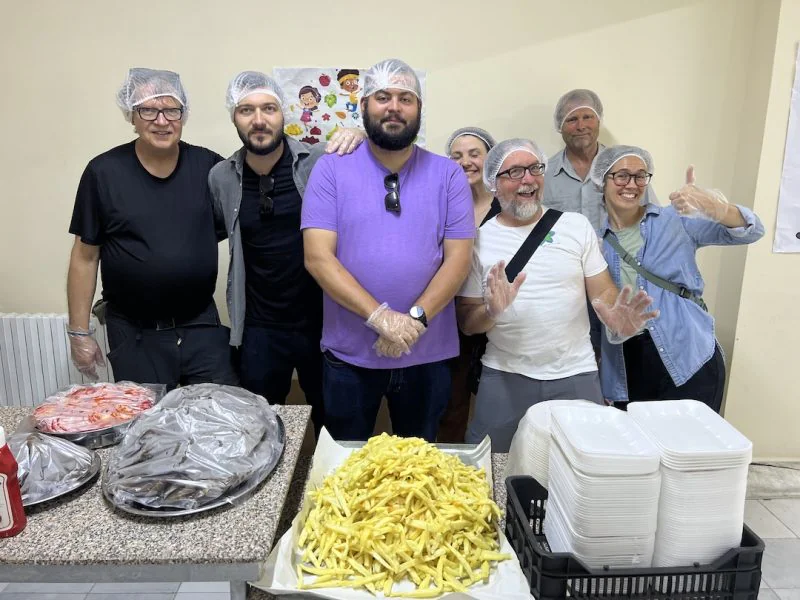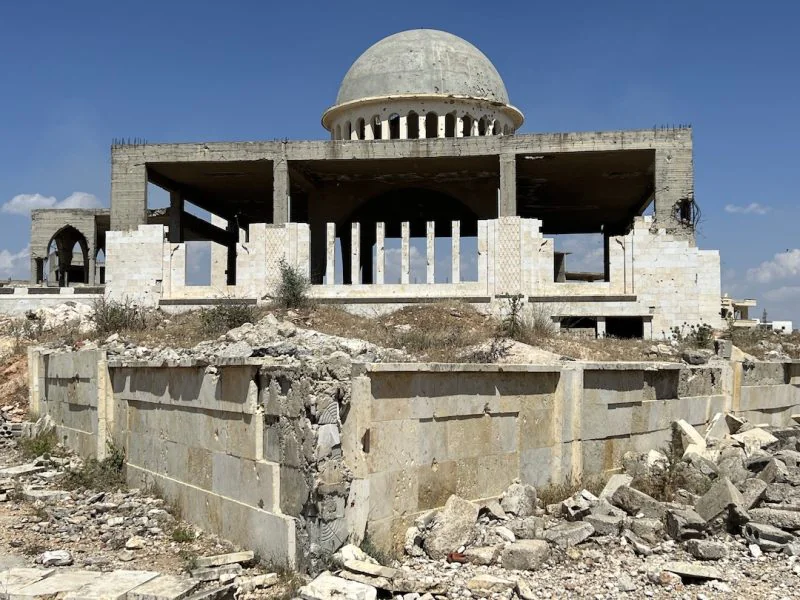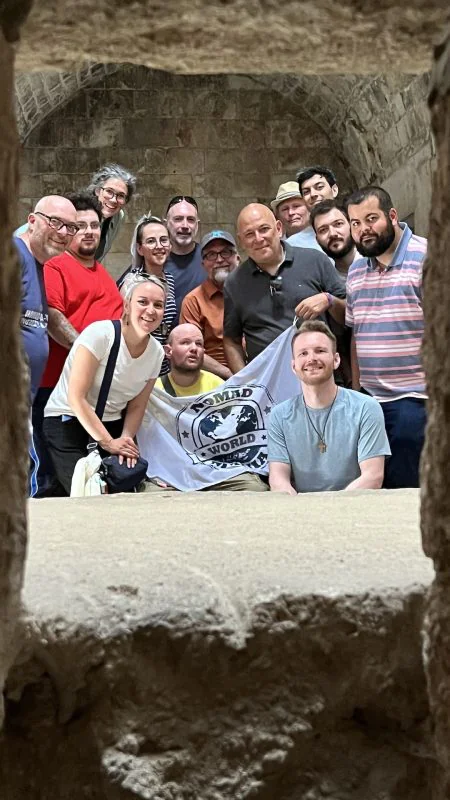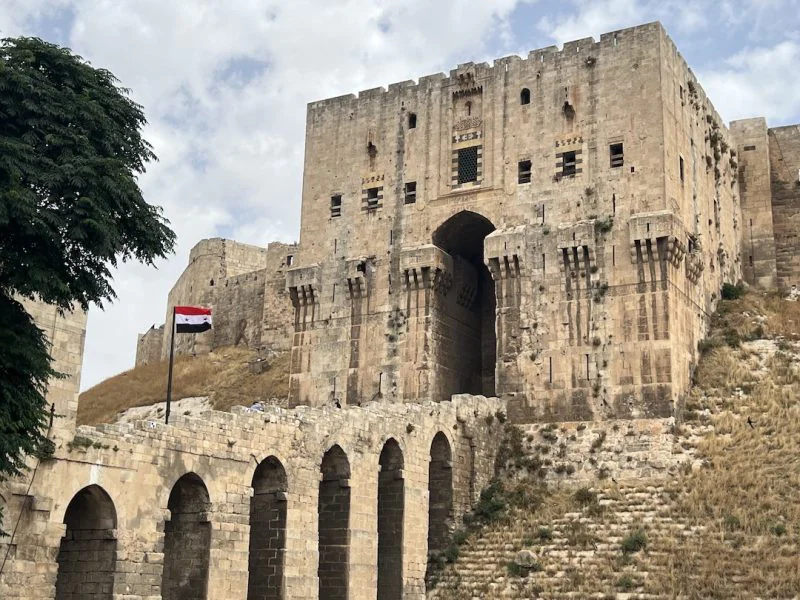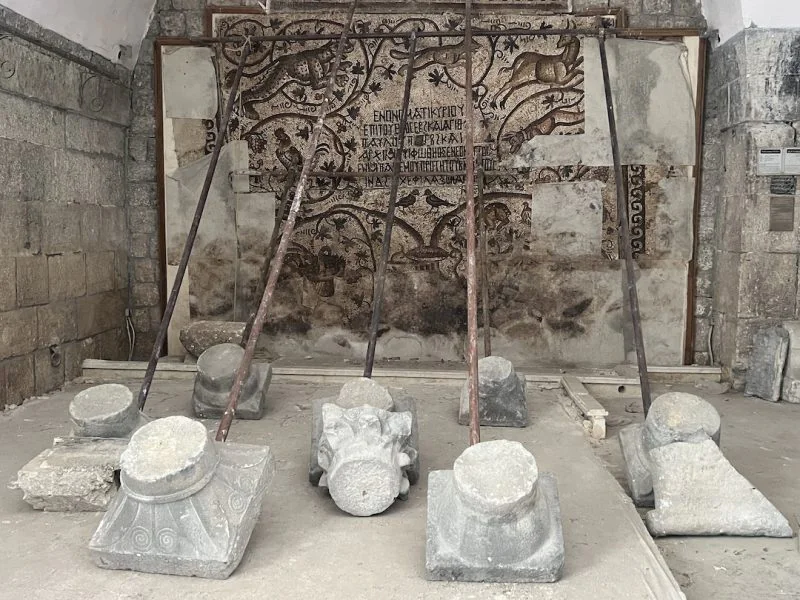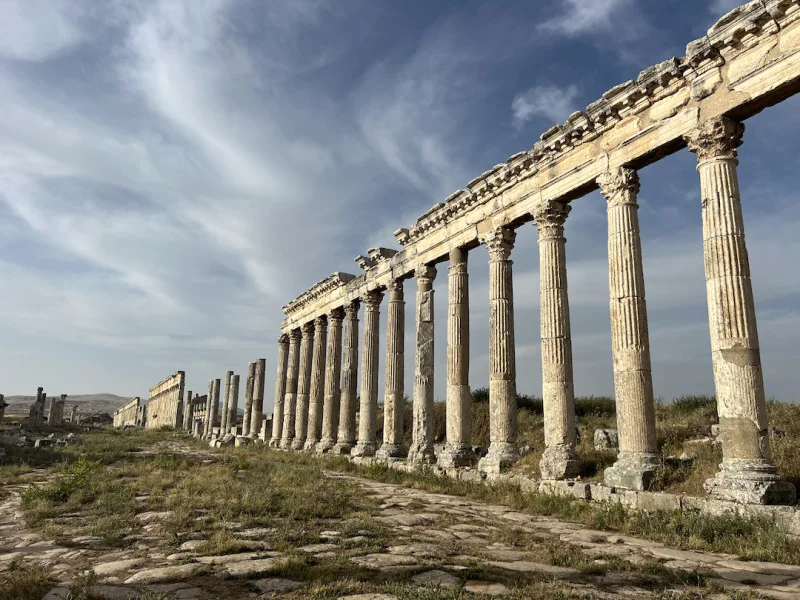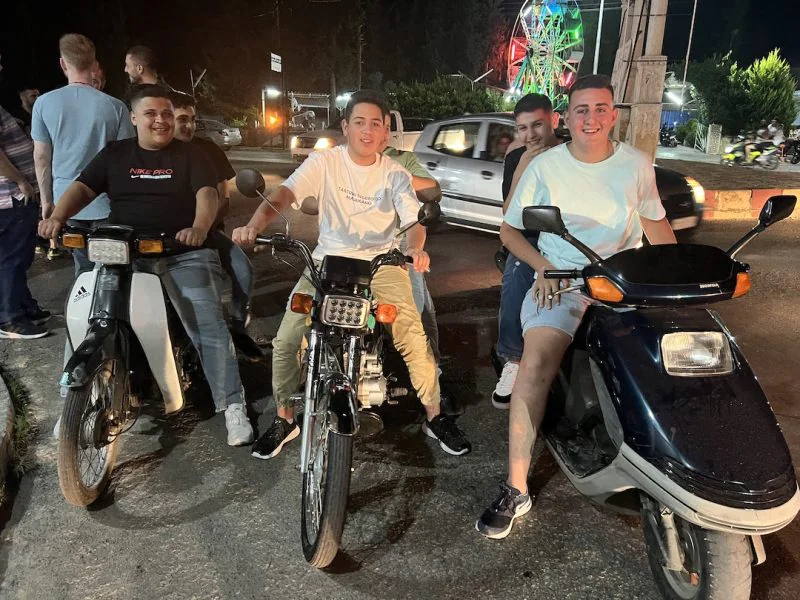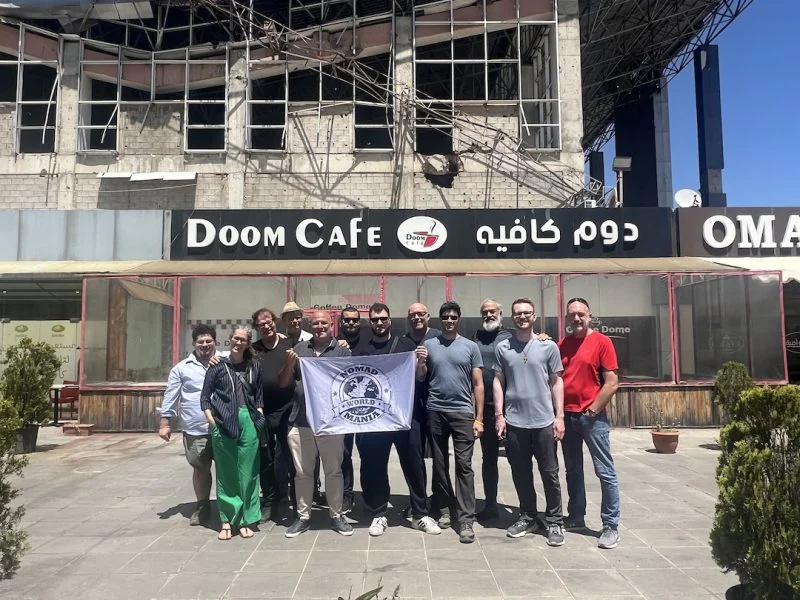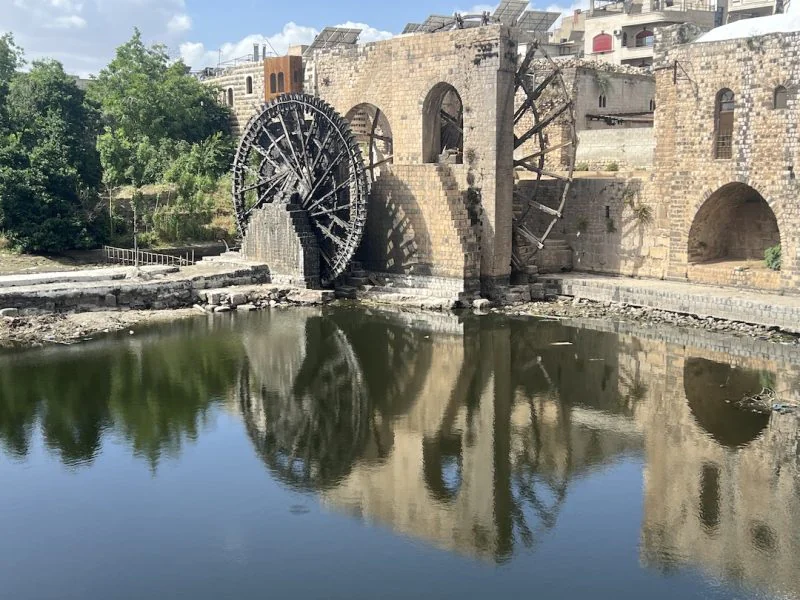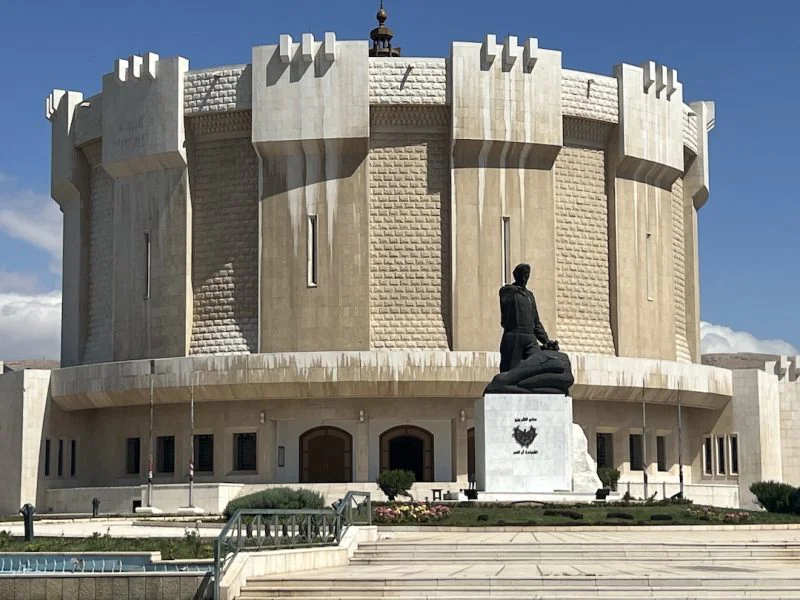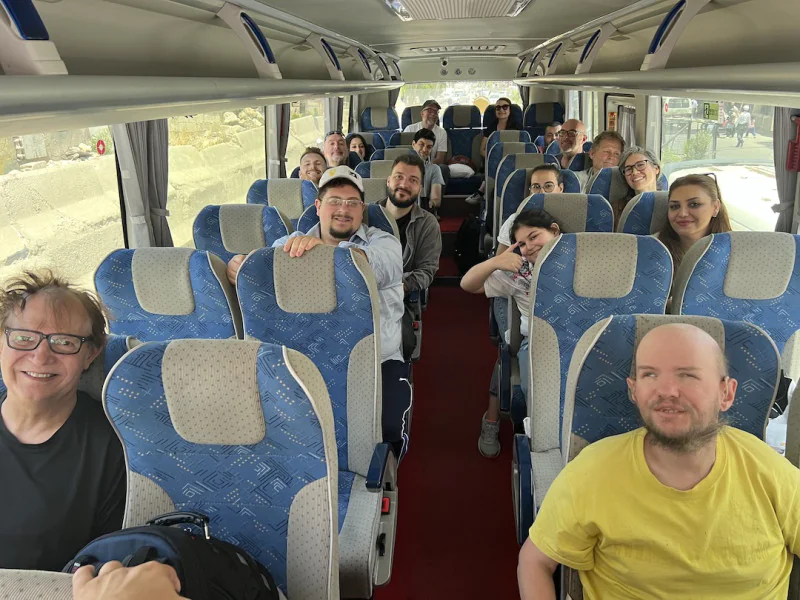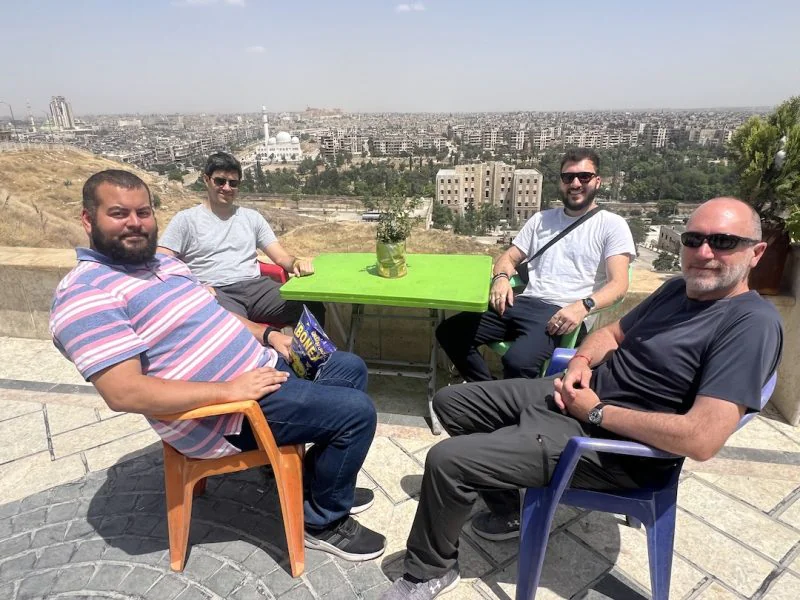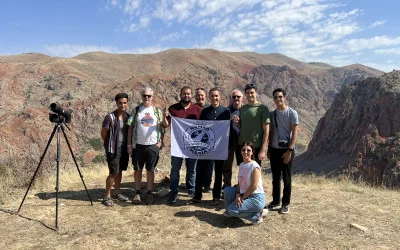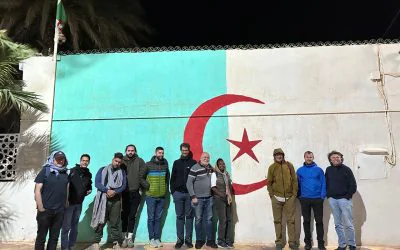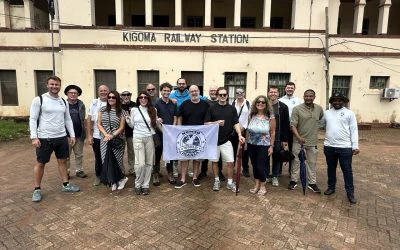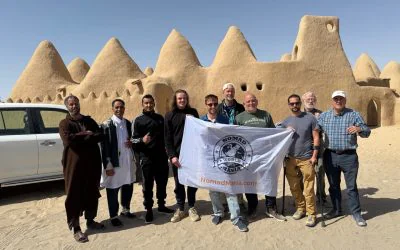A week in Syria
written by NomadMania Founder, Harry Mitsidis
I wonder if you’ve ever ended a tour hugging your guide who is crying her heart out in your arms. This is exactly what happened at the end of the first NomadMania Syria trip which took place from May 18 to 25th. But what series of events led to this explosion of emotion?
When I completed my visit to every country in the world in March 2008, my first trip was a third visit to Syria. At the time I had barely visited any countries needing a visa twice, let alone attempt a third try. But Syria had been so fantastic those first two times, I just wanted more. And then the civil war started… It took me a lot of thought to dare return in September 2023, with guilt at the ethical perspective of it. I took the plunge for a quick two-day trip in case I felt the place was so dark that I couldn’t take it.
On that trip I met Fadi Assi, co-founder of Golden Team Syria, who would subsequently win the vote for Most Trusted Fixer in the NomadMania Travel Awards 2023. Fadi’s welcome, the presence of his charming wife and adorable two daughters, as well as Syria’s resilience, made me think again. So much was written about this country under sanctions. But wouldn’t it be fair to try to show it to the NomadMania community? To dispel those myths that this was a really dangerous and dark place when the charm of the old city of Damascus was still alive and well. Certainly the hospitality of the Syrians seemed to be reaching new highs.
The subsequent trip and the groups of willing travellers were a collection of curious explorers who, despite their doubts and possible worries, wanted to see for themselves what was going on in Syria. The women wondered if they needed to come veiled. Were laptops allowed in? What about a microphone? Should people avoid shorts, dressing conservatively? What was the alcohol situation? What about the government’s support of Russia? Would that pose dangers to citizens of ‘unfriendly countries’? Fadi answered everything with his standard phrase: no problem. We weren’t entirely convinced and treaded with trepidation.
Damascus
From the very start, there was evidence to dispel our fears. From the smile and welcoming eyes of our primary guide Ola to the palatial ambiance of Al Pasha hotel with its huge chandeliers. From a lunch fit for kings where the food never seemed to end and everyone was already full by the time the main course appeared much to everyone’s surprise, to the random strangers waving at us, it became apparent that Syria was not the demonic pariah that people had feared.
The atmosphere in Damascus seemed relaxed, almost euphoric. There was no destruction to be witnessed anywhere near the old town. A host of refurbished old houses were now guesthouses waiting for those guests. Antique shops were open selling wares from decades long gone and blending in with the classic architecture of what is the oldest inhabited capital in the world.
A walk to the Omayyad Mosque on a Saturday afforded us a look at the many locals who were congregating outside one of the marvels of Islamic design, a UNESCO World Heritage Site. We saw some Russian military outside; intimidated, we tried to stay clear until they asked us where we were from. This was to be the only time we would witness any Russians during our stay, and despite very occasional opportunities to purchase products featuring Putin, the country’s alliances would soon be sent to oblivion in our minds, overshadowed by much more heartfelt memories.
Bosra
Day 2 featured another UNESCO World Heritage, Bosra. For me, its Roman theatre is the most impressive anywhere, beating any competition in Northern Africa or the Mediterranean. Bosra used to be a major tourist destination, for good reason. The likes of Julio Iglesias, among others, have sung in the theatre whose acoustics we were about to test ourselves. Nowadays Bosra is a shadow of its former self.
The rebels came very close to conquering the place; the locals fought themselves to protect their heritage from having the same fate as Palmyra. They succeeded but barely. The town itself is eerily quiet. It is outside the area of government control which means there are no portraits of President Assad to be seen. Rather, a local force is in power here, which has brokered a deal of ‘acceptance’ with the government. They don’t fight, but they get to do their own thing, while welcoming the few brave foreigners who attempt the 90-minute drive from Damascus to near the Jordanian border to see a marvel of ancient architecture.
As we are photographing the fantastically preserved site, saved by having being buried in the sand for centuries, suddenly an ethereal figure clad in a red dress appears and starts singing the saddest operatic tune in Arabic. Seated up above on the centuries-old stones, we can hear her voice, like a goddess speaking to our soul, perfectly clear. It turns out that the manager of Golden Team is a graduate of the music academy with a truly divine talent. This experience alone, in an ancient venue where one could conjure images of life where life is no longer, would be enough to rate this trip as a poignant, life-changing experience.
The desperate souvenir sellers of Bosra, once guaranteed a reliable number of tourists, are chasing us to sell what worn wares or ancient postcards they possess. Most of us buy something out of sheer compassion.
The evening ends with a show of whirling dervishes over yet another extravaganza of a dinner, and as if the show of contortions, colourful costumes and lights is not enough, we head to the karaoke bar. The alcohol flows very freely in Syria and what better way to celebrate it than a host of cacophonous renditions of worldwide hits? Fadi and his team sing their evergreen Arabic hits; we went for ‘My Way’ and ‘Dancing Queen’. All this in St Paul’s pub in the middle of the old town of Damascus.
The economy of Syria has obviously tanked under the sanctions. But one cannot pay in foreign currency so we have to change small amounts here and there, ending up with huge wads of bills. The highest bill of 5,000 Syrian is worth around 33 cents; a bus ticket costs 1,000 dinars while bread, which is subsidised, apparently only 400. But even at the karaoke bar, admission with two alcoholic drinks is 100,000 (i.e. a bit more than $6) and that is in the expensive old town. That gives you an impression of the general price level. We never experience the electricity woes of the locals as the places we head to have generators. In reality, some locations have just an hour or so of electricity per day.
The scale of destruction becomes apparent as you take the road north of Damascus, on the highway that leads to Homs and Aleppo. Whole neighbourhoods have been flattened here, including a number of government buildings. It may be early morning as we leave the capital and the silence may be the exhausted vocal chords or the hangover. Or it may be the sudden realisation that the bubble in old Damascus is just that.
But our bubble continues in the bucolic charms of the countryside where we visit a rose-drink ‘factory’, first the plantation itself where we are told how the rose oil is extracted and then to the local village where in a private home, the elixir is distilled quite professionally in an old-fashioned way. It looks a bit like making moonshine to me, but apparently it is quite legit as the labels on a variety of products suggest. The local family present us with rose and mint drinks which we consume eagerly as the day is getting hotter. It is these interactions with families that give the trip its human face, the face of Syria, which looks increasingly benevolent, kind and innocent.
Maaloula
Maaloula was badly hit by the rebels. Occupied for more than a year, nuns were abducted, locals kept by the terrorists in caves until ransom paid, and what was once a holy city became a battleground. The scars are more than evident in the sanctuary of Saint Thekla where some of the icons have been defaced, literally; some others have been redone. We take turns to meet a nun who gives us a small bracelet for 15 cents per piece. But she refuses to take any money from our group’s most legendary member, Tony Giles. She said she will pray for him. When our guide Ola tells the nun that he is both blind AND deaf, she shakes her head and crosses herself.
Tony is the true revelation in our group of 14. In many ways, he is the glue of our group, and we all take turns to talk to him, be next to him and have the honour of partaking in his perception of the world. A teacher to us all, Tony is certainly the funniest person in the group and has the gift of self-sarcasm that is the best of the British. When one says inadvertently ‘You’ll see’, he retorts ‘I most certainly won’t’ in a monotone voice that shows his peace with his situation.
He will not be pitied; he commands respect, and respect him we do as we admire his tenacity and his courage to explore the world his own way, by touching, by asking us to tell him what we see outside the window, by sensing the smells, the sounds and the atmosphere. How he can perceive colour I don’t know. Our second guide, Touleen, Ola’s sister, is constantly with him throughout. The level of attention and care that she is giving him is exemplary and yet I can see that she is more than conscious of the fact that she is with a legend, and she is relishing every moment.
Crac des Chevaliers is one of the majestic castles at the top of a hill. Almost invincible, it was lucky to survive the civil war despite it being hit. This cooler, hilly area of Syria, near the border with Lebanon to the south but also not too far from the coast, is a diverse mosaic of villages with different religions and traditions. We have a fantastic visit to the castle, unrushed and extensive, where our Envoy Coordinator for the United States Michael Ballard is almost in tears; his childhood dream of seeing the castle, the place he has mentioned so many times in his history lectures to his students, is finally coming true.
He is the slowest of the group, taking in the preserved ornate details, the levels of architecture, the moat and the panorama in slow motion. This is perhaps the only time where Tony cannot follow the rest of us as we tread on the outer wall of the edifice and see the green hills in front of us. But he and Touleen are doing the castle in their way. Ola finally becomes a tourist too; after countless visits, she has yet to take a photo of herself looking outside in pensive mode, a tourist classic. I get her to pose and she smiles; she is now one of us too!
The trip wouldn’t be complete without the experience of wine and liquor production. The local production plant called Kafraya exports to the Netherlands from an associate place in Lebanon, which came as a surprise. It is interesting to see the conveyor belt of filling the bottles of arak, the local women employed there – mainly because so many of the men are no longer in Syria. What is more interesting is the local workers’ desire to show off their skills, with the forklift driver especially happy to pose for the camera. In fact, the whole factory stays extra for us as we arrive after their normal working hours. But beyond that, the factory owner and manager gift us a crate of wine, just like that. No ‘gift shop’ or purchasing opportunities, just old-fashioned free of charge gifts!
Rabah & Aleppo
What is for many remembered as the best experience of the whole week is the visit to Fadi’s native village of Rabah. For sure there are no unmissable sights here and probably we are the first group of foreigners to ever reach this small mountain village. But what makes the visit is the local welcome.
In unison, as if the whole village has awakened, we are welcomed by enthusiastic young people and a mayor in his late thirties, who take us on a tour of the two churches – one Catholic, one Orthodox – and the narrow streets. We are accompanied by a trumpet player and a drum, and gradually more and more people join the group until we are a true mass of people walking down, the older residents waving to us from their balconies. Ice cream is the order of the late afternoon and of course it is on the house, or ‘on the village’ shall we say. The simple charms of a quiet place with welcoming residents truly make our stay.
Visiting a school for deaf children in Aleppo was a more sombre event, especially as we had our very own Tony visiting with us. It is apparently the only school of this size in the country and one can only imagine the problems they have. They recently moved to an area on the outskirts of Aleppo which is otherwise totally destroyed. It was here that we could truly understand the extent of the calamity that had happened to Syria.
The combination of dark tourism and the innocence of the children exemplified the mixed emotions that we would have at almost every step. The deaf children put on a dance show for us even though they couldn’t hear the music that we could. We did our bit by preparing the burger and fries meal that they got for lunch. And we didn’t mind a burger lunch ourselves after days of hummus, tabbouleh and incredible Arabic meals.
Aleppo itself seems in better shape than I had expected. The citadel was more damaged by the earthquake than by the war and only recently reopened, so we got lucky. The area around it is flattened and the National Museum looks rather poor, with only one wing open in what could have been a major archeological museum. But generally the city has survived, the clock tower stands, the Sheraton has kept its name even though the franchise has nothing to do with it.
The central square sports the huge Syrian flag – at half mast during our visit to commiserate the passing of the Iranian president – and the bustling shopping areas are alive and well. Aleppo still has the pep that I remember from 2005 even if the souq below the citadel is no more. The better areas of town to the north, well built with handsome three to four story blocks made of stone, are all pleasing to the eye. It is certainly not the devastation I expected.
It also happens to be the last day of school, so our visit to the citadel coincides with what seems like the entire youth of the country visiting, allowing interactions with enthusiastic locals who are genuinely happy to see us. An elderly man tells Ola that ‘there is hope for our country after all’ when confronted with the unexpected group of camera-clicking tourists.
My biggest disappointment in Aleppo was missing the chance to photograph the pink beetle we fleetingly passed. Beetle as in the famous car, which in Syria is still going strong in a variety of colours. I found myself hunting these old-timers along with a Lincoln, a Dodge, a Mini Cooper and others and by the time we were done the whole group were shouting out to me when we would pass a beetle. But I only saw that one pink one, and now I will not rest until it has been traced again. Not that the battered blue one, the gold one or the orange one are lesser models…
Throughout the week, Fadi kept on ensuring we would get nice surprises along the way. He made caps for us with the NomadMania logo in the Syrian flag colours to begin with. And he went out of his way to give added value to what was already a very good value trip. One of these surprises became my personal favourite of the week, the former mosaic museum in the town of Ma’arat al Nu’man, half way between Aleppo and Hama.
This town has been completely destroyed and is visible from the highway. Just shells of the buildings abound, witnesses to the dreadful losses that the now empty space endured. The town used to have 30,000 inhabitants but now only has 500, though where exactly is unclear. Just how Fadi secured the permit for a bunch of NomadManiacs to enter and visit the former museum, only he knows. But we were welcomed by the local military with warm smiles and saw what used to be a caravanserai, then a museum and now an edifice full of rubble and the remaining mosaics part of the devastation.
The juxtaposition of the ancient works of art, some in the Greek script, and the debris just blew my mind. Claire, one of two ladies in our group who has spent five years in Jordan, was also totally blown away by this. To add to the insanity of it, the guard took us underground, to what had been the damp, inhospitable headquarters of the terrorists/freedom-fighters/rebels (call them what you want) who took over this place. The whole experience was totally surreal. The chance that the mosaics can be redeemed seems very slim though they have been protected as best as possible.
After that, the ruins of the ancient town of Apamea seem luke-warm despite the mile-long colonnade which is in generally good shape to this day. We are more taken by some Bedouin children, including a young girl with stunning green eyes. But the activity that follows is once again the people-pleaser we cannot get enough of. Distant relatives of Fadi in the all-Christian Orthodox town of Muhradah are having us over for dinner. This implies not only home-made food, but dancing with four generations of smiling people.
Meanwhile one of our group is feeling poorly and is examined by the local doctor who is summoned. The thorough examination is given without charge, because we are guests in the country. We subsequently head to the centre of this small town where it seems everybody is out in cafes enjoying themselves while very inquisitive who these foreigners are. We chat with teenagers on motorbikes and well-dressed young ladies who seem the better students. The boys all smoke and act macho but admit they are not just bad at English, but in all subjects.
We head for ice-cream to the local shop and people living on either side invite us in for coffee, tea and conversation. Sadly, we don’t have the time. But the party atmosphere of what is little more than a village is certainly not what one would expect when one hears the word Syria. I meet a lady whose 11-year old daughter smiles; her father was killed by a mortar bomb when she was one. So, beneath the loud music, the cigarettes and the modern cafes, a story of tragedy is never far away.
Hama & Homs
Hama and Homs are not particularly huge on sights despite being considerable urban centres. Hama is famous for its wheels, of which a couple make for pleasant camera-pleasing stops. Homs is known for the Saint Mary Church of the Holy Belt, where allegedly the belt of the Mother of Jesus can be seen. Other than that, Fadi and I discovered ‘Doom Café’ in the area that was occupied by the rebels, cutting the town off in two for years. A group photo of Doom Café under the metallic contour of what used to be a stadium makes for another one of those ‘Bizzarium-worthy’ moments.
Return to Damascus
We are physically tired by the last day. It has been intense and an emotional rollercoaster and we are well-aware that we have had a unique experience thanks to the amazing Ola and Touleen but also an exemplary group, where each and every one contributed to the feeling of togetherness and camaraderie. We are in for a final treat in Damascus, one that proves divisive: the panorama.
This is a North Korean built circular memorial to what is known as the Yom Kippur war, though you’ll never hear that word here. The glory of the Syrian army and their success in storming the enemy headquarters on Mount Hermon is presented as an outstanding military achievement. Outside, there are tanks and planes and some vehicles seized from the eternal enemy. After a week with very friendly, down to earth people, this North Korean-like experience is quite jarring. The fact that the war was actually lost is never mentioned; visitors leave with the impression that Syria came out totally victorious.
One of us now names Syria his favourite country of the 123 he has visited. Another says he wants to take another trip to Syria as soon as possible. Claire is looking into moving here if it is at all possible, I feel I have made not friends but family here, people who give without thinking twice about it. Somehow, we have all been spellbound. The combination of the traditional and old, young people who don’t stare at their phones, food that tastes of the earth, and stories of survival and endurance make for an irresistible cocktail we want to have more of.
We’ve saved the Golan Heights for last. Fadi tells me that he is the only one who successfully gets permits to head there given that the situation is such that travel to the area is not doable. We drive through barren lands closer to the mountain, we successfully pass the checkpoints and see the UN camp. This is officially the UN-Controlled Buffer zone but we don’t see any forces around. We are ascending through places where few have ever been to. In the distance there seems to be a big village but I can’t find one on the map and my GPS is malfunctioning and shows me in Beirut, where I am obviously not.
That is under Israeli control, says Ola, choking. Indeed, as we get close, at a distance far less than a kilometer, we see what is the village of Majdal Shams, at the northern tip of the Golan Heights. Our coach and convoy stop by a viewing platform with the Syrian flag painted on it, and we all descend, entranced not only at the ability to see what is Israeli-controlled land just a few meters away, but also at how this border has been impenetrable for more than 75 years. We will end our trip here, and Group 2, headed by our manager Orest, is just starting it here. What a place for the two groups to mingle.
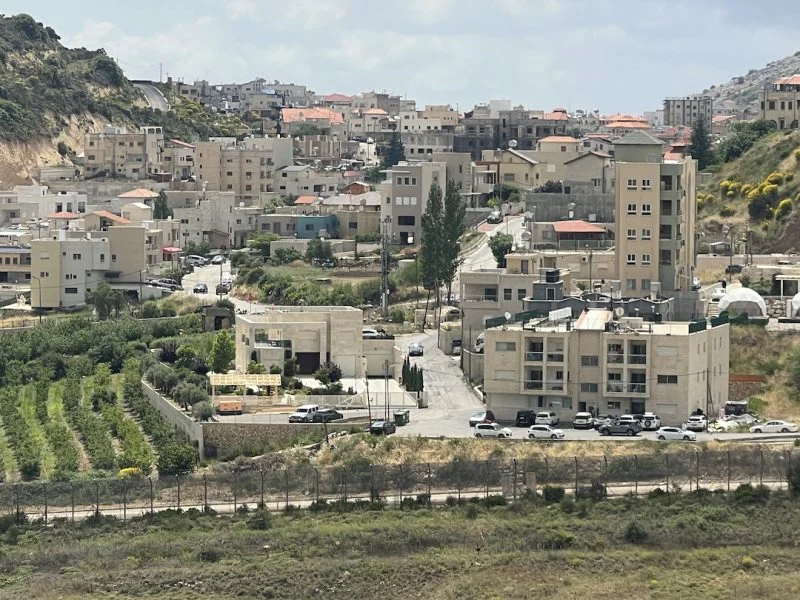
Majdal Shams as seen from the Syrian side.
Yet, there is a personal story unfolding in the midst of all the commotion. Ola, who is a Druze, has family in the Israeli-controlled Golan. There are four Druze villages there, she tells me. The people have never left but have also not accepted Israeli citizenship. They cannot travel to each other’s countries; they recently met in Jordan for the first time in years. And knowing she would be coming here, she got her enthusiastic 17-year old cousin from the other side all excited. He drove to the road across from where we are, perhaps 500 meters away and stands there by his car. We should have brought binoculars.
Ola sees him and screams at him, waving her arms. But the wind is too strong and he is but a vague small figure by a white car. Ola summons everybody to shout ‘Amir’. And so we do, 1-2-3 AMIR! Can he hear anything across the meters that separate families who cannot meet? (we later found out that he did hear us, and he filmed us from his end).
For a minute, I am too thrilled at being at the border, too happy clicking away at the claimed territory of what is Syria’s eternal, worst enemy. But then I look back and see Ola withdrawn in the background behind all the raised phones taking their panoramic views. I approach her and look at her face filled with tears. I take her into my arms and she cries on the shoulder of a foreigner who was a stranger to her just one week ago. And I realise that we have not only been in Syria for a week, we have been with Syria, for Ola is a true representation of her country. Sensitive, hurt, bleeding, in tears and yet proud, open-hearted, kind and ultimately perhaps the biggest human in the world.
Join Our Next Adventure to Syria
We are proud to present our next Syria Tour with an enhanced which will take place from 8-17 September 2024 and will also include the cost and Maaloula Cross Festival. See all the details of the upcoming Syria Tour here.
For a glimpse into the profound impact our previous trip had on its participants, read the testimonials below.
Testimonials
History, hospitality, and ice cream—these probably aren’t the first words that come to mind when one thinks of Syria. Yet, this is a country that defies expectations. During a ten-day visit, our group sang karaoke in Damascus, had an impromptu parade in the village of Rabah, and toured a ransacked museum of ancient mosaics, the restoration of which, stands as a testament to the steadfast Syrian spirit. The people, both vibrant and welcoming, are full of love and hope for the future. None of this should stay a secret. Safety was never a concern, and others—Americans included—shouldn’t hesitate to pay a visit to this country that is both eager to please and sure to surprise.
- Lee Sandberg, Princeton, NJ
Being a relatively inexperienced traveller, this was my first visit to the Middle East. Our amazing local guides organised everything perfectly and exposed us to so much of Syria’s rich history and culture, but what blew me away the most was the warmth, openness and generosity of its people. I will never forget our impromptu ‘parade’ around the small village of Rabah to drum and trumpet fanfare, with locals greeting us with smiles and “welcome!” from their doorways and balconies. The trip of a lifetime for me, which certainly won’t be my last to the region.
- Sean Brannan, Lviv, Ukraine
I can’t express how grateful I am to NomadMania for the opportunity to join their group trip to Syria. I’m passionate about ancient civilizations and Bible history, and this was the main reason I decided to go to Syria; this trip delivered more than I could have asked for. The local team in Syria went above and beyond to help deliver for all of our individual asks, which was absolutely incredible! If you’re looking to add Syria to your upcoming travel list, NomadMania is the group to choose!
- Austin Davis, Birmingham, AL
From the bus driver to the door man at the hotel in Damascus to the waiter staff and our excellent guides Ola and Touleen to the deaf school kids we meet at their school to the random person on the street and to all the people we meet along our one week-long trip around Syria, there is a one common denominator. The most kind, friendly and welcoming people ever. It truly was the highlight of the trip to talk and listen to the Syrian people, hearing about their lives, their struggles, their frustrations about the sanctions put against them and so on, but also listening to the hope, determination and belief that one day everyone will come together as one for a better and more prosperous Syria. This is a country with so much history and beauty to show the world and on top of that the most amazing people. Please put Syria on your bucket list as you will not be disappointed.
- Peter Fenger, Lisbon, Portugal
The nine day guided tour of Syria, organised by NomadMania and Fadi Assi, was amazing. So many places visited, famous cities and unknown villages, famous UNESCO Sites and little known churches. But for me, especially as a blind traveller, it was the Syrian people – amazing. kind, generous and so hospitable… Also the variety of food: truly delicious, particularly hummus! My fellow travel companions and our wonderful guides, Ola and Touleen were fantastic. They looked after me splendidly. We had fun, particularly at the karaoke, but with the local families we were so fortunate to visit and experience. A magical trip I’ll never forget.
- Tony Giles, Teignmouth, England
This journey in Syria has been not only wonderful, but ground-breaking and educational. The people are so kind and loving, and have never done anything less than welcome us wholeheartedly. Our group has visited the Golan Heights for the first time in a while, and helped to reopen a hotel due to our stay there. The sites have been amazing and there seems to be a surprise around every corner. I wish the Syrian people nothing but happiness and an end to any misfortunes and difficulties, which they seem to overcome with their tenacious spirit and boundless ingenuity. Many thanks to Golden Team and NomadMania for a seamlessly bountiful experience!
- Stuart Gourd, Austin, Texas
Our day in the Golan Heights was special for many reasons, but for me, to visit with our bus driver was a touching experience. Born in the Golan Heights, he left when he was one, and had never been back. That morning, he showed up at the bus with a fresh haircut, and collared shirt. A man of few words, he was so proud to explain where his village was in relation to where we were standing, and who of his family was still there. How incredibly special to share the experience with him. For me, this sums up our trip: we didn’t just see the sights, we were warmly welcomed by Syrians, and invited to share precious moments together.
- Claire Pritchard, Edinburgh, Scotland
As a traveler who seeks out historical sites, Syria did not disappoint. The immaculate ruins of Bosra, the gem that is Palmyra, and crowned by Krak des Chevaliers and Maaloula—Syria was a country I enjoyed to no end. To top it off, I admire these people who have been battered by war, yet continue to show warmth to all they meet. It would not have been possible without Fadi, Lujain, and Noura leading the way. I am incredibly greatful to everyone for making these travels a reality for me. Whenever I return, I will undoubtedly return with NomadMania and Golden Team leading the way!
- Stephen Nemeth, Grants Pass, Oregon
I am glad I joined the trip to Syria – it was an interesting trip, to an interesting country, together with interesting (and nice!) people. I am especially happy I got to visit the Golan Heights, Palmyra, Aleppo. Places impossible to visit on my own. The trip also sparked an interest of knowing more about Syria and the places we visited. So, in that sense my trip has just begun, a learning process I really look forward to. It was also nice to be met with such a warm welcome from the Syrian people: “Welcome to Syria, my friend!”
- Therese Jingnert Sundberg, Gothenburg, Sweden
My trip to Syria was nothing short of amazing! As a 20-year-old who’s traveled to 75 countries, Syria stands out for its rich history and incredible hospitality. Walking through Old Damascus felt like stepping back in time, with its ancient streets and vibrant souks. Hama’s waterwheels, Homs’ resilience, and Aleppo’s historic sites left me in awe. Visiting Krak des Chevaliers was like living in a medieval story. Rabah offered a serene retreat, while an evening with a Christian Syrian family in celebration was heartwarming and unforgettable. Exploring Palmyra’s ruins, Bosra’s amphitheater, and the poignant history of Quneitra deepened my appreciation for this resilient country. Syria’s blend of ancient history and warm, welcoming people made this journey truly unforgettable.
- Matei Rusu, Liège, Belgium
Even after a week to reflect on it, Syria is still our favorite country. The sites were amazing and exceeded our expectations, but the interactions with the people and the rest of the group were the things we will remember and cherish the most. We count ourselves extremely fortunate to have traveled with an incredible group.
- Angela and Michael Ballard, Chattanooga, Tennessee


